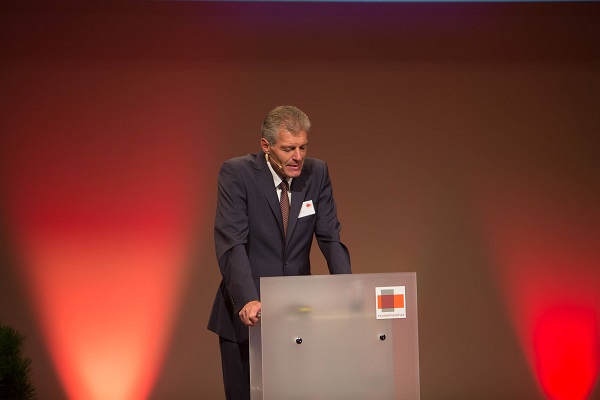Ways out of the Europe dilemma
Switzerland's future role in Europe was the focus of this year's annual meeting of economiesuisse. Even 30 months after the adoption of the mass immigration initiative, there is still no viable solution for its implementation, stated economiesuisse President Heinz Karrer in his address on "Business Day".

"Progress is only possible in an open system, and excellence requires the unhindered exchange of ideas and people," says Prof. Dr. Lino Guzzella, President of ETH Zurich.
In his address to around 500 guests from the worlds of business, science, culture and politics, President Heinz Karrer said that our country was in a dilemma when it came to implementing the mass immigration initiative. However, he said, it was up to us to set the course for economic policy in such a way that Switzerland would continue to be one of the world's most attractive business locations in the future.
State Secretary Jacques de Watteville spoke about the current challenges in the negotiations with the European Union. ETH President Lino Guzzella outlined the framework conditions for a successful education and research location. The President of the Swiss Confederation, Johann Schneider-Ammann, conveyed the Federal Council's greetings.
The mass immigration initiative is shaping the current debate on our country's future relations with Europe - but above all on the preservation of the bilateral agreements from which Switzerland benefits substantially in economic terms. It was obvious that Switzerland was in a dilemma here.
The already difficult search for an amicable solution with the EU will be made even more difficult by the UK's exit from the EU.
Helping to shape policy
Switzerland can hardly influence many economic and political changes in the world, said Karrer. But it can take on the associated challenges. And in particular, it can influence the framework conditions in its own country in such a way that it remains one of the most attractive business locations in the world.
What Switzerland needs now is investment in the dual education system, innovation and taxation (CTR III), emphasises Heinz Karrer. A prospering economy depends on a high level of legal certainty, political stability and strong social cohesion. It is therefore important that entrepreneurs are also involved in society in some way outside their core business - be it in associations, foundations or in politics.
Swiss European policy?
State Secretary Jacques de Watteville, Chief Negotiator for the Switzerland-EU dossiers, addressed the current challenges facing Swiss European policy. He explained that Switzerland and Swiss companies needed access to the EU's internal market and legal certainty. He said that regulated relations with the EU were needed in order to maintain prosperity, jobs, added value, know-how and tax revenues in Switzerland. "This is only possible if we consolidate the bilateral path," State Secretary de Watteville continued. So there needs to be an amicable solution with the EU on the immigration issue, as well as agreement on the institutional issues.
Access to the talent pool is essential
In his presentation, Lino Guzzella outlined the profile of a successful education and research location and the framework conditions required to achieve this. He said it was crucial that universities continued to have access to the national and international talent pool. Guzzella: "If we want to remain among the best, we need the brightest minds from Switzerland and around the world.
Progress is only possible in an open system and excellence requires the unhindered exchange of ideas and people." In this context, Guzzella emphasised the importance of Switzerland once again becoming a fully associated member of the European research framework programme "Horizon 2020" from 2017. In addition to openness, autonomy and sufficient funding were two other important conditions for universities such as ETH Zurich to remain competitive in the future.









